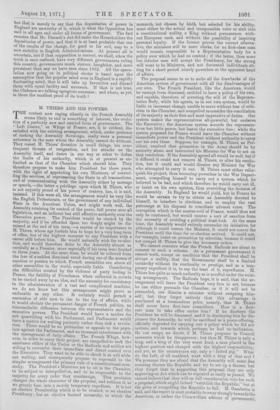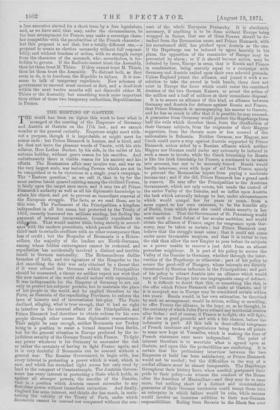M. THIERS AND HIS POWERS.
THE contest now raging silently in the French Assembly seems likely to end in something of interest, the evolu- tion of a perfectly new and untried form of government. The " Left Centre," or Whigs of France, are, it is evident, dis- satisfied with the existing arrangement, which, under pretence of making the Assembly Sovereign, really vests a personal autocracy in the man whom the Assembly cannot do without. They resent M. Thiers' dictation in small things, his over- frequent threats of resignation, and his attacks on the Assembly itself, and desire in one way or other to define the limits of his authority, which is at present as un- limited as that of the Chamber which elected him. They therefore propose to make him President for three years, with the right of appointing his own Ministers, of control-
ling the services, of representing the State in all transactions, and of communicating with the Assembly either by message or speech,—the latter a privilege upon which M. Thiers, who is not unjustly proud of his power of oratory, has, it is said, insisted. If this were all, the arrangement would be very like the English Protectorate, or the government of any individual State in the American Union, and might work well, the Assembly retaining its control of the purse, full power over all legislation, and an indirect but still effective authority over the Executive power. The President would be elected by the majority, and if he offended them too deeply might be dis- missed at the end of his term,—a matter of no importance to M. Thiers, whose age forbids him to hope for a very long term of office, but of the highest moment to any. President with a career still before him. He would naturally wish for re-elec- tion, and would therefore defer to the Assembly almost as carefully as a Premier, more especially if his term were limited to three years. At the same time, he would be relieved from the fear of a sudden dismissal voted during one of the scenes of emotion or passion to which French assemblies are, above all other assemblies in the world, especially liable. Considering the difficulties created by the violence of party feeling in France, the liability of Frenchmen when collected in crowds to be carried away by an idea, and the necessity for consistency in the administration of a vast and complicated machine, we do not know but this arrangement might prove as endurable as any other. It certainly would permit a succession of able men to rise to the top of affairs, while it would obviate the permanent danger of French politics, an irreconcilable difference between the representative and the executive powers. The President would have a motive for not quarrelling with his Parliament, and Parliament would have a motive for waiting patiently rather than risk a revolu- tion. There would be no pl6biscites or appeals to the popu- lace against the Parliament, and no incessant interference with the management of daily affairs. The French Whigs, how- ever, in order to carry their project, are compelled to seek the assistance either of the Tories or the Radicals, and neither are willing to surrender their immediate and direct control over the Executive. They want to be able to check it at will with- out waiting, and consequently propose to superadd to the simpler arrangement the primary rule of a Constitutional mon- archy. The President's Ministers are to sit in the Chamber, to be subject to interpellation, and to be responsible to the majority for every order they countersign. This provision changes the whole character of the proposal, and reduces it, as we greatly fear, into a merely temporary expedient. It is not an elective Premiership which is to be created, or an elective Presidency ; but an elective limited monarchy, in which the monarch, not chosen by birth but selected for his ability, must either be the actual and irresponsible ruler or sink into a constitutional nullity, a King without permanence, with- out European rank, and without the possibility of inspiring personal loyalty. If the former proves the correct alterna- tive, the ministers will be mere clerks, for no first-class man would remain responsible to a Representative body for a policy over which he had no control ; if the latter, then none but inferior men will accept the Presidency, for, the strong will want to be Ministers, and not decorated individuals sit- ting for a short period utterly powerless at the apparent head of affairs. The proposal seems to us to unite all the drawbacks of the American system of government with all the disadvantages of our own. The French President, like the American, would be exempt from dismissal, entitled. to have a policy of his own, and capable, therefore, of arresting the will of the Represen- tative Body, while his agents, as in our own system, would be liable to incessant change, unable to move without fear of criti- cism in the Chamber, and compelled to consider the conciliation of its majority as their first and most imperative of duties. Oar system makes the representatives all-powerful, but enslaves the Executive ; the American system accords the representa- tives but little power, but leaves the executive free ; while the system proposed for France would leave the Chamber without immediate power and the President without authority to carry out his own ideas. Suppose, for example, M. Thiers, as Pre- sident, resolved that promotion in the Army should be by seniority alone, and instructed his Minister for War to act on that resolution. If the Assembly agreed all would be well, but if it differed it could not remove M. Thiers, or alter his resolu- tion, but it could and would dismiss any Minister for War who attempted to carry it out. M. Thiers must either relin- quish his project, thus becoming powerless in the War Depart- ment, compelling himself to carry out a system which he believed to be bad, and which therefore he would carry out ill, or insist on his own opinion, thus overriding the decision of the Assembly. In England he would yield, but in France he would be certain to try to obtain an Assembly devoted to himself, to interfere in elections, and to employ the vast patronage at his disposal to conciliate adverse votes. The corruption which is the master-evil of France, would thus not only be continued, but would receive a sort of sanction from the necessity of avoiding a political dead-lock. At the same time, the Assembly would entirely surrender its initiative, for although it could coerce the Minister, it could not coerce the President until the time for re-election arrived. It could not, for example, insist on promotion by selection, because it could not compel M. There to give the necessary orders. We cannot conceive what the French Radicals are about to consent to such a scheme. As a permanent government it cannot work, except on condition that the President shall be always a nullity, that the Government shall be a limited monarchy without its continuity or prestige, and as a tem- porary expedient it is, to say the least of it, superfluous. M. Thiers has quite as much authority as is needful under the exist- ing arrangement. The Radicals hope, it is said, that the ar- rangement will leave the President very free to act, because he can either persuade the Chamber, or if it will not be persuaded, can dismiss a minister without resigning him- self ; but they forget entirely that this advantage is purchased at a tremendous price, namely, that M. Thiers
shall never have first-rate councillors. How is a first- rate man to take office under him ? If he disobeys the President he will be dismissed, and if in disobeying him he dis- pleases the Assembly, ho will be sacrificed as a peace-offering, officially degraded for carrying out a policy which he did not initiate, and towards which, perhaps, he had no inclination. He can resign, no doubt, if M. Thiers proposes in Council measures which he disapproves ; but then M. Thiers is only a king, and a king of the very worst kind, a man placed in the highest position and charged with the highest responsibility, and yet, as his countrymen say, only a " fatted pig." What do the Left, of all mankind, want with a king of that sort ? We presume they are afraid that the Assembly will some fine morning disown the Republic and try to set up a throne, but they forget that in supporting this proposal they are only approving an Act which can be repealed as easily as passed. We cannot believe that they will on full consideration vote for such a proposal, which might indeed "establish the Republic," but at the price of compelling the Republic to fail. M. Gambetta is said, and the report is most probable,to sway strongly towards the American, or rather the Cromwellian scheme of government,
a free executive elected for a short term by a free legislature, and, as we have said, that may, under the circumstances, be the best arrangement for France, may make a sovereign cham- ber compatible with the peculiarities of the French character ; but this proposal is not that, but a totally different one,—a proposal to create an elective monarchy without full responsi- bility, and without freedom of action, with no strength except from the character of the monarch, who, nevertheless, is for- bidden to govern. If the Radicals cannot trust the Assembly, then let them trust M. Thiers. If they cannot trust M. Thiers, then let them trust the Assembly. To distrust both, as they seem to do, is to foredoom the Republic to failure. It is non- sense to talk of temporary expedients. New schemes of government to succeed must succeed at first, and a dead-lock within the next twelve months will not discredit either M. Thiers or the Assembly, but something much more important than either of those two temporary authorities, Republicanism in France.































 Previous page
Previous page